Navy seeks permission to use JPMC helipad for medical emergencies
A day after a helicopter landed on the newly-built helipad at the Jinnah Postgraduate Medical Centre (JPMC), the Pakistan Navy sought the hospital administration’s permission to use it for medical emergencies and other important missions.
Navy officials wrote to JPMC Executive Director Dr Seemin Jamali on Monday to say that since they have no helicopter landing site available for medical emergencies near the hospital, the armed forces can use its helipad.
They, however, pointed out that before using the hospital’s helipad, they would need to carry out some practice runs during the day and at night so that its proper use could be ensured. The navy’s letter to the JPMC comes a day after a helicopter of the Sindh government had landed on the hospital’s newly-built helipad, paving the way for the transportation of critically injured and sick patients from the far-flung areas of Sindh and Balochistan.
Dr Seemin said they have received the navy’s request for practice runs, adding that they have forwarded the letter to the Sindh Health Department and the provincial government for necessary guidance and permission.
“The Pakistan Navy has assured us that adequate firefighting staff and arrangements would be made during the practice runs and during landings in case of emergencies. This facility would be used only for evacuating critically sick patients — civilians and those belonging to the armed forces — during peace and war time.”
She said that following these practice runs, they can have patients brought in through public and private air ambulance services as well as helicopters of the armed forces, who remain at the forefront of disaster management in case of natural or man-made calamities.
On Sunday, strict security arrangements had been made at the JPMC for the helicopter’s landing, for which the Civil Aviation Authority had issued the hospital with a no-objection certificate. The District South administration had arranged a fire brigade to deal with any eventuality.
The JPMC’s deputy directors, including Dr Yahya Tunio, Dr Salman and Dr Asadullah, and officials of the Sindh Rangers and police were present on the occasion. Dr Seemin said helicopter ambulances used to bring in patients to the hospital back in the 1990s, but the helicopter flights discontinued when the condition of the helipad deteriorated.
“The need for having a reinforced helipad at the JPMC re-emerged given the incidents of explosions in the far-flung areas of Sindh and Balochistan. Now patients can be brought to the hospital within a couple of hours from any area in the provinces.”
Thanking the provincial government, particularly the health department, she said that more services of international standards were being provided at the JPMC “to facilitate a large number of patients who come to Karachi from the entire Pakistan as well as abroad for quality treatment”.
Dr Tunio said the helipad was a reinforced landing platform, “which means that military-grade helicopters, helicopter ambulances and mid-sized transport ambulances can also land here”.
He said the District South administration would provide a fire engine whenever a helicopter would be landing at the JPMC’s helipad.”The presence of a fire engine and an ambulance is a must when a helicopter lands at any regular helipad.”
-
 Dua Lipa Wishes Her 'always And Forever' Callum Turner Happy Birthday
Dua Lipa Wishes Her 'always And Forever' Callum Turner Happy Birthday -
 Police Dressed As Money Heist, Captain America Raid Mobile Theft At Carnival
Police Dressed As Money Heist, Captain America Raid Mobile Theft At Carnival -
 Winter Olympics 2026: Top Contenders Poised To Win Gold In Women’s Figure Skating
Winter Olympics 2026: Top Contenders Poised To Win Gold In Women’s Figure Skating -
 Inside The Moment King Charles Put Prince William In His Place For Speaking Against Andrew
Inside The Moment King Charles Put Prince William In His Place For Speaking Against Andrew -
 Will AI Take Your Job After Graduation? Here’s What Research Really Says
Will AI Take Your Job After Graduation? Here’s What Research Really Says -
 California Cop Accused Of Using Bogus 911 Calls To Reach Ex-partner
California Cop Accused Of Using Bogus 911 Calls To Reach Ex-partner -
 AI Film School Trains Hollywood's Next Generation Of Filmmakers
AI Film School Trains Hollywood's Next Generation Of Filmmakers -
 Royal Expert Claims Meghan Markle Is 'running Out Of Friends'
Royal Expert Claims Meghan Markle Is 'running Out Of Friends' -
 Bruno Mars' Valentine's Day Surprise Labelled 'classy Promo Move'
Bruno Mars' Valentine's Day Surprise Labelled 'classy Promo Move' -
 Ed Sheeran Shares His Trick Of Turning Bad Memories Into Happy Ones
Ed Sheeran Shares His Trick Of Turning Bad Memories Into Happy Ones -
 Teyana Taylor Reflects On Her Friendship With Julia Roberts
Teyana Taylor Reflects On Her Friendship With Julia Roberts -
 Bright Green Comet C/2024 E1 Nears Closest Approach Before Leaving Solar System
Bright Green Comet C/2024 E1 Nears Closest Approach Before Leaving Solar System -
 Meghan Markle Warns Prince Harry As Royal Family Lands In 'biggest Crises' Since Death Of Princess Diana
Meghan Markle Warns Prince Harry As Royal Family Lands In 'biggest Crises' Since Death Of Princess Diana -
 Elon Musk Weighs Parenthood Against AI Boom, Sparking Public Debate
Elon Musk Weighs Parenthood Against AI Boom, Sparking Public Debate -
 'Elderly' Nanny Arrested By ICE Outside Employer's Home, Freed After Judge's Order
'Elderly' Nanny Arrested By ICE Outside Employer's Home, Freed After Judge's Order -
 Keke Palmer On Managing Growing Career With 2-year-old Son: 'It's A Lot'
Keke Palmer On Managing Growing Career With 2-year-old Son: 'It's A Lot'




